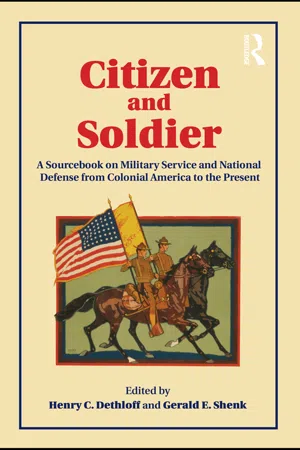CHAPTER 1
COLONIAL AND REVOLUTIONARY AMERICA
The founding documents of the United States, the Declaration of Independence and the Constitution, established the principles and institutions that defined the role of the military in American life. Although these principles and military institutions were central to the Revolution against England, they reflected one hundred and fifty years of colonial military tradition and experience. At the core of these traditions lay several apparent paradoxes that persist in American culture to the present day. The first is that in most colonies and local communities all free adult white males were involuntarily enrolled in the permanent militia, yet there was a deep distrust of permanent military institutions. The second is that involuntary enlistment in the militia came into conflict with a growing belief, especially during the eighteenth century, in individual freedom and rejection of social hierarchies. A third paradox is that although militia service was officially associated with the status of free white males, increasingly during the eighteenth century, and continuing into the Revolutionary War, it was the poor, the indentured servants, and sometimes former slaves who actually did the fighting, when it came to that.
These, however, are broad generalizations whose appropriateness varies from place to place at different times. In the seventeenth century, the Virginia Company expected its male settlers to be armed and prepared to defend themselves. But those men frequently challenged how and when they were to fight, and who would command them. Captain John Smith felt that these men were unreliable as soldiers, and demanded that the Virginia Company provide a mercenary army under his command that would allow the settlers to cultivate their plantations in security without interruption. Free white men opposed the enlistments of white male indentured servants and Negroes, while men from both of these groups frequently demanded the right to join militias. But as John Smith had argued, militias tended not to be the best defense in the Chesapeake region, where homes and plantations were scattered across the countryside. It was different in Massachusetts, where close-knit towns made militias more practical. In both Virginia and Massachusetts, colonial statutes assumed that free white men would be armed and ready to fight as part of their respective militias, if called. Pennsylvania was very different in this respect. The political power of the Quakers, and the presence of other pacifist religious groups, such as the Mennonites and Amish, who had been invited there by William Penn with the promise that their pacifist beliefs would be honored, meant that mandatory militia duty for all white males never became associated with citizenship in Pennsylvania.
Despite strenuous efforts to change this, Benjamin Franklin and others in Pennsylvania only succeeded in establishing a volunteer militia. The following documents illustrate both differences and similarities with respect to whom was expected or required to perform military service in seventeenth-century Virginia, eighteenth-century Pennsylvania, and eighteenth-century Massachusetts.
***
These First Laws of Virginia made it very clear that every colonist had an obligation to assist in defense of the colony and their own household. Laws also provided for some degree of standard armaments for each household, in quantity if not in quality. It is also notable that the community had an obligation to care for those who were hurt, injured, or maimed in their course of defending the community. The 1657–58 law also provided a special exemption to a group of recent settlers, presumably that they might organize and construct their farms and homes—but that ministers and their families were not exempted from service when called upon.
***
The New England Articles of Confederation of 1643 in a very broad sense foreshadowed the adoption of the Articles of Confederation that were adopted by the Revolutionary Government of the United States in 1781. Prominent in both documents was the understanding that the defense of any one element of that union (colony, plantation, or household) was a responsibility and an expense to be borne by all.
***
In 1652, Massachusetts adopted an act specifying that militia enlistments were to include “all Scotsmen, Negers and Indians inhabiting with or servants to the English.” According to historian Benjamin Quarles, “four years later the legislature prohibited the mustering in of Negroes or Indians, explaining the step as necessary in the interests of ‘the better ordering and settling of severall cases in the military companyes.’”
PENNSYLVANIA’S COLONIAL MILITIA
Pennsylvania’s 1671 “Laws of the Duke of York” required that every person who can bear arms from 16 to 60 years of age “be always provided with a convenient proportion of powder and bullet for service for their Mutual Defence, upon a penalty for their neglect … That the quantity of powder and shot…be at least one pound of powder and 2 pounds of bullet. And if the Inhabitants…...
